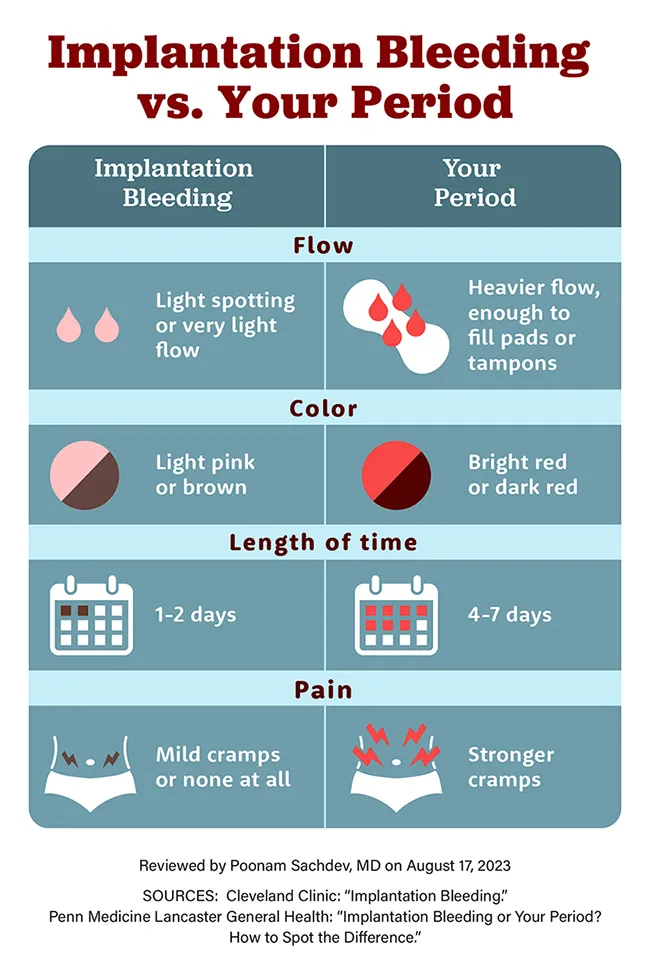What Is Implantation Bleeding?
Implantation bleeding is light bleeding from the vagina that happens in some people 10-14 days after they conceive a baby.
You may think it’s just a light period, but it can be an early sign of pregnancy. It’s not dangerous, and you don’t need treatment.
But heavy bleeding (more than you’d have with a typical period) can be a sign of a problem. Call your doctor if you bleed a lot (with or without fever or chills) or have cramps that get worse.

How Common Is Implantation Bleeding?
Implantation bleeding is considered a normal part of pregnancy. About 1 in 4 pregnant people will have it. If you have implantation bleeding, you may not even notice.
When Does Implantation Bleeding Happen?
After a sperm fertilizes your egg, the combined cells form an embryo. It travels to your uterus, where it implants itself into the lining.
Sometimes, as the embryo attaches, it causes a little bleeding. This usually happens about the time you would have your period. You may even confuse it with your period and not realize you’re pregnant. Implantation bleeding is normal and doesn’t mean you or your baby will have problems.
What Does Implantation Bleeding Look Like?
Implantation bleeding tends to happen before you notice morning sickness. You might have:
- Blood that’s brown or pinkish
- Blood that’s lighter in flow and doesn’t last as long as your period
- Mild or no cramping
What color is implantation bleeding?
This bleeding doesn’t look like your monthly period, which is bright red or dark red for most people. Implantation bleeding can range from light pink to brown or dark brown. And it’s more like vaginal discharge than your regular period.
How to Know It’s Implantation Bleeding
It’s probably implantation bleeding if you have some of the other early signs of pregnancy, including:
- Sore, swollen breasts or nipples
- Fatigue
- Headache
- Upset stomach
- Throwing up (morning sickness)
- Food cravings or aversions (a strong dislike or disgust for certain foods)
- Mood swings
- Peeing more than usual
If you’re not sure whether it’s implantation bleeding or your period, take a pregnancy test or talk to your doctor.
How Long After Implantation Bleeding Can I Test?
Pregnancy tests you take at home check for a hormone called hCG in your pee. Your hCG level starts rising after the embryo implants in your uterus wall. If you take the test too early, you might get the wrong result. It’s a good idea to test three to six days after the implantation bleeding stops.
Your doctor might give you a blood test that checks for higher levels of hCG. It can find hCG much earlier.
Is It Implantation Bleeding or Your Period?
Other than the color of the blood (pink or brownish vs. red or dark red), there are a few other differences between implantation bleeding and your regular period:
How long it lasts. Implantation bleeding lasts about one to three days. Your period normally lasts a week or so.
The amount of blood. Implantation bleeding is really just spotting or a very light flow. For your period, you can use several pads and tampons. It starts heavy and lessens as the days go on.
Cramping. With implantation bleeding, you might get very mild cramps, if you get them at all. Cramping for your period can start a day or two before the bleeding starts, and the pain can be intense in some people.
Can implantation bleeding be red?
If your blood is red, it’s probably your period or another issue.
Does implantation bleeding have clots?
Implantation bleeding usually doesn’t cause clots. Some people (but not everyone) have clots with their regular periods.
Can implantation bleeding be heavy?
Some people think it’s a mistake to call it implantation “bleeding” because it’s usually spotting or a very light flow at most. Regular periods can be quite heavy, enough to soak pads and tampons.
How long does implantation bleeding last?
Unlike most periods, implantation bleeding usually stops after a day or two.
What Should I Do if I Have Implantation Bleeding?
Implantation bleeding stops on its own. If you’re worried that you’ve bled a lot, call your doctor. They may ask about the amount of blood and its color to examine the situation.
Other Causes of Bleeding During Pregnancy
Many things can cause bleeding when you’re pregnant. Some of them are harmless, and some are serious. If you’re bleeding a lot — with or without pain or cramping — call your doctor.
If you’re pregnant and see blood in your underwear, it may be caused by:
Sex. Hormonal and physical changes may be to blame for this. It should stop on its own.
Fibroids and polyps. Your doctor might do some tests to check for these growths on your uterus.
Cervical problems. Conditions like infection or growths on your cervix can also cause bleeding.
Infection. Sexually transmitted infections (STIs) such as trichomoniasis can cause light bleeding as well as more serious problems. Starting treatment as soon as possible will keep your baby healthy.
Ectopic pregnancy. This is when an embryo implants outside your uterus. You may have bleeding with pain and cramps. It’s dangerous and needs medical care right away.
Miscarriage. About 15% of known pregnancies end during the first few months. Bleeding and cramping often happen afterward. Call your doctor right away if you know that you’re pregnant and you have these symptoms.
When to See a Doctor
Call your doctor if the bleeding doesn’t stop after a few days or if you’re worried about how much you’re bleeding.
Takeaways
- Implantation bleeding happens after an embryo attaches to the wall of your uterus. It’s spotting (very light bleeding) that lasts a day or so and is not nearly as heavy as a regular period.
- It’s very common and stops on its own.
- One way to know it’s implantation bleeding: You may have other early symptoms of pregnancy, such as sore breasts or morning sickness.
- Wait a few days after the spotting stops to do a home pregnancy test. Your doctor can do a blood test earlier than that to tell you whether you’re pregnant.
Implantation Bleeding FAQs
Here are some of the most commonly asked questions about implantation bleeding.
Can you test positive during implantation bleeding?
If you take a home pregnancy test during your implantation bleeding, the result is more likely to be negative than positive (even if you are pregnant). The test checks for the amount of the hormone hCG in your pee. Your body doesn’t start making more hCG until the embryo attaches to the uterus. So, if you take it too soon, the level will still be low. To get a correct result, it’s best to wait until a few days after the implantation bleeding stops. If you want results earlier, talk to your doctor about a blood test. The hCG will show up faster there.
Can implantation bleeding last five days?
Normally, implantation bleeding lasts a day or two. Sometimes, it lasts only a few hours. It’s rare for it to last more than three days. If what seems to be implantation bleeding does go on longer than that, it’s probably not implantation bleeding. It might be your regular period or some other issue.
Can implantation bleeding fill a pad?
No, implantation bleeding won’t fill a pad. It may be enough blood to see on a panty liner, but it shouldn’t be heavy enough to soak a pad.
Does implantation bleeding always mean you are pregnant?
Not every time. Implantation bleeding can’t happen without a fertilized egg. But there are more steps that need to happen for a healthy pregnancy. It’s possible to have implantation bleeding and pregnancy loss.


